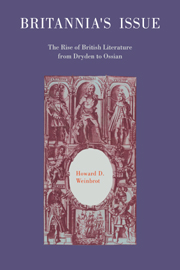Book contents
- Frontmatter
- Contents
- Acknowledgments and editorial notes
- INTRODUCTION: An overview of scope and method
- PART I CONTEXTS: INTELLECTUAL, PSYCHOLOGICAL, AND NATIONAL
- Prologue to Part I
- 1 MODERNS, ANCIENTS, AND THE SECULAR: THE LIMITS OF SOUTHERN HEGEMONY
- 2 THE SPIRITUAL: TRUTH WAS NOT THE INCLINATION OF THE FIRST AGES
- 3 AN AMBITION TO EXCEL
- 4 THE MAKING OF A MODERN CANON
- PART II TEXTS WITHIN CONTEXTS. ESSAYING ENGLAND: OUR GENIUS, OUR CLIME
- PART III GROWING ONE'S OWN. THE BRITISH ODE FROM COWLEY TO GRAY
- PART IV EXPANDING THE BORDERS. JEWS AND JESUS: THIS ISRAEL, THIS ENGLAND
- PART V CELTS, GERMANS, AND SCOTS: TOWARDS A UNITED KINGDOM
- APPENDIX: The text of Handel's “Israel in Egypt”
- Index
3 - AN AMBITION TO EXCEL
Published online by Cambridge University Press: 15 December 2009
- Frontmatter
- Contents
- Acknowledgments and editorial notes
- INTRODUCTION: An overview of scope and method
- PART I CONTEXTS: INTELLECTUAL, PSYCHOLOGICAL, AND NATIONAL
- Prologue to Part I
- 1 MODERNS, ANCIENTS, AND THE SECULAR: THE LIMITS OF SOUTHERN HEGEMONY
- 2 THE SPIRITUAL: TRUTH WAS NOT THE INCLINATION OF THE FIRST AGES
- 3 AN AMBITION TO EXCEL
- 4 THE MAKING OF A MODERN CANON
- PART II TEXTS WITHIN CONTEXTS. ESSAYING ENGLAND: OUR GENIUS, OUR CLIME
- PART III GROWING ONE'S OWN. THE BRITISH ODE FROM COWLEY TO GRAY
- PART IV EXPANDING THE BORDERS. JEWS AND JESUS: THIS ISRAEL, THIS ENGLAND
- PART V CELTS, GERMANS, AND SCOTS: TOWARDS A UNITED KINGDOM
- APPENDIX: The text of Handel's “Israel in Egypt”
- Index
Summary
Given so many reservations regarding the classical past, most eighteenth-century writers scarcely quivered beneath the shade of Homer's or Virgil's amply blooming and very different trees. Instead, they normally made sane assessments of their own, their contemporaries', and their varied predecessors' moral and literary abilities – often distinguishing between those two traits. Alexander Pope well illustrates the ability to compartmentalize, so that the horror stories chronicled in the previous chapters could be suspended during the acts of reading and of learning to write.
Pope, for example, was appalled by classical Augustan politics and enthralled by classical Augustan art. His Temple of Fame (1715) includes Virgil, whose labored, finished, patient “unweary'd Art” has deservedly earned him “A Golden Column … / On which a Shrine of purest Gold was rear'd.” Virgil himself, Pope later tells Joseph Spence, nonetheless was a “slavish … writer” whose Aeneid lacked a single honest line. The Georgics begin with “the grossest flattery to Augustus that could be invented. The turn of mind in it [is] as mean as the poetry in it is noble.” Those distinctions, indeed, may have helped modern authors soberly to assess the past and their own relation to it.
Those whose assessments were wrong – like Charles Churchill in his angry dismissal of Homer – often were either conventionally idiosyncratic or vainly and commercially self-interested. Even for such authors, however, the past was neither bunk, nor unapproachable, nor radically discontinuous with the present, since it needed to be known in order to be scolded.
- Type
- Chapter
- Information
- Britannia's IssueThe Rise of British Literature from Dryden to Ossian, pp. 78 - 113Publisher: Cambridge University PressPrint publication year: 1993



